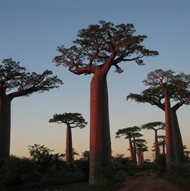Our Planet Reviewed
On the eve of 2010, International Year of Biodiversity, the National Museum of Natural History and Pro-Natura International are working in partnership with IUCN to launch “Our Planet Reviewed”, an unprecedented programme of naturalist expeditions.

Photo: http://www.flickr.com/photos/dmontesi/66753981/
The expeditions will span ten years to conduct a massive inventory of biodiversity in geographical areas which, up until now, have been little explored. The objective is to accelerate the scientific discovery of new species, by focusing our efforts on the regions of the planet which are considered a priority in terms of nature conservation.
Between April 2009 and June 2010, Madagascar and Mozambique will host a series of expeditions on sea and land. Under the leadership of Professor Philippe Bouchet, from the National Museum of Natural History, and Olivier Pascal, from Pro-Natura International, these expeditions aim to develop existing knowledge of biodiversity in regions which are considered to be the richest in species, but which are also lesser known and the most threatened on the planet.
Over four months of research in the field, around a hundred participants across all disciplines, from all around the world, and exceptional technical resources bear witness to the scale of this inventory project. These new expeditions will draw on the expertise acquired during Santo 2006, an inventory operation carried out in the Vanuatu archipelago, in the heart of the South Pacific, which revealed several hundred new species.
Essentially dedicated to neglected biodiversity, such as marine and land invertebrates, plants and fungi, which represent 95 percent of biodiversity and play a fundamental role in the balance of ecosystems, the Mozambique/ Madagascar project intends to return this field of research, all too often ignored in favour of large fauna, to its proper place and thereby encourage new conservation policies, which are no longer solely based on emblematic species.
Disappearing habitats (forests, coral reefs), overexploitation, pollution, climate change - there are numerous causes for the disappearance of living things and the scale of the biodiversity crisis is now proven. The actual number of living species could be between eight and 30 million, yet only 1.8 million are currently known. A quarter, or even half, of these species could disappear from the planet by the middle or the end of this century; the issues at stake are therefore substantial and, now more than ever, it is time to start a new pattern of exploring and describing biodiversity.
Mozambique and Madagascar are home to an exceptionally rich flora and fauna, which is still largely unknown, despite the attention which has been accorded to Madagascar, in particular, by nature protection organizations over a number of years. Therefore, it is natural that these two large countries should form a strategic target for scientists.
Two sites, which have been identified as priority areas, will therefore form the object of the explorations:
- MOZAMBIQUE
November-December 2009
Land expedition in the dry forests of North Mozambique
Objective: To explore and describe terrestrial fauna and flora (insects, small mammals, plants)
- MADAGASCAR
April 2009
Marine expedition to the shrimp beds on board the oceanography vessel Vizconde de Eza
Objective: To sample the deep aquatic fauna of the Mozambique Channel
June - July 2009
Exploration on board the shrimp trawler Miriky
Objective: To sample the sea bed between 100 and 1000m depth in the North Mozambique Channel
April-June 2010
Atimo Vatae marine expedition in the cold water at the extreme South of Madagascar (Fort Dauphin region)
Objective: to explore and describe marine fauna and flora (molluscs, fish, algae)
A specific website for the project
The Museum has created a bilingual website (French/English) entirely dedicated to the project: This allows the public to follow the expeditions, take a look behind the scenes and share the researchers’ day to day experience through photos, reports, interviews and much more. www.laplaneterevisitee.org and www.ourplanetreviewed.org
An educational project
A new educational project based on the expedition has also been set up by the Museum’s teaching directorate for the 2009-2010 academic year. Designed for French-speaking teachers all around the world (French academies, the Indian Ocean), a range of educational resources is offered free of charge to teachers on the project’s website. A competition will be held for classes involved in this project.
Major Sponsors:
The Prince Albert II of Monaco Foundation - www.fpa2.com
The Total Foundation - www.fondation.total.com
The Stavros Niarchos Foundation - www.snf.org
Press contacts:
Agence The Desk
Tiffany Steigerwald - 00 33 (0)1 77 37 29 96
T.steigerwald@thedesk.fr
Muséum national d’Histoire naturelle
Estelle Merceron - 00 33 (0)1 40 79 54 40 - merceron@mnhn.fr
Vanessa Bismuth - 00 33 (0)1 40 79 81 36 - vbismuth@mnhn.fr
presse@mnhn.fr
Scientific and institutional partners:
Mozambique: The Mozambique Institute of Agricultural Research (IIAM); The Royal Botanic Gardens, Kew; The Montpellier Centre for Biology and Population
Management
Madagascar: The Spanish Institute of Oceanography (IOE); The University of Tulear Institute of Fisheries Research and Marine Science (IH.SM); Wildlife
Conservation Society (WCS) – Madagascar Program



